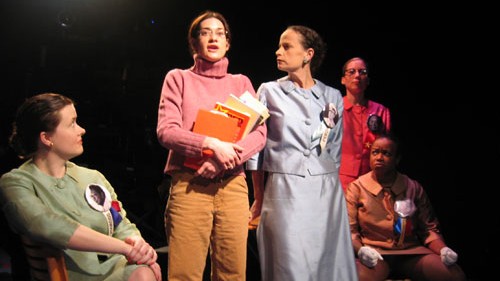Mr. Burns, Anne Washburn’s seminal play, remains, as the kids say, “that girl”—and rightfully so. Its freewheeling blend of humor, cultural references, and theater history continues to surprise and delight those who encounter it. We’d also be remiss if we didn’t mention that one of its original delights was the role created by the Tony-nominated Bernstine. But, before Mr. Burns—and more importantly, before the musicals Here Lies Love and Six—there was The Ladies, a play about the notable wives of even more notable dictators.
Well, sort of.
The Ladies takes the lives of women adjacent to, or complicit in, massive abuses of power and turns their stories into a meditation on the kind of mental fortitude it takes to be a woman, whether in a communist regime or as an artist at large. Formally, The Ladies is a grab bag of ingredients both mad and methodical: quotes from the ladies in question (Eva Perón, Elena Ceausescu, Imelda Marcos, Jiang Qing); transcribed tapes of Washburn and director Anne Kauffman’s conversations vis-à-vis the play, and various sundry interpolations from the cast, which includes Bernstine rattling off Ceausescu’s biography in less than a minute.
“Wanting to matter, to be needed and loved is part of the human project. But, in The Ladies, this primal desire is warped almost beyond recognition until we recognize ourselves.”
Beautiful Lies, Beautiful Liars
As the ladies drink tea, snark at each other, eat invisible cookies, and sing original songs, it’s clear that Washburn’s interest is less about historical accuracy and more about what power and control do to the psyche. To this point, Perón remarks that power is really just “vomit” and that perhaps the reason we seek it, the reason men seek it, is to escape our suffering and the suffering of others. Marcos reinforces this thesis in a monologue where she says simply that her ability to transform the suffering self into a strong and beautiful self is a power most of us are too afraid to access. This ability, however, is really a result of willful self-delusion. And delusion is not cheap.
To this point, some of the most fascinating thematic chords occur in the conversations between playwright and director, notated with every repetition and “like” or “um” intact. The two of them wrestle with their fascination with these women, gamely alternating between respect, horror, and reluctant resonance. A particularly striking moment arrives when Kauffman explains her own desire for power as an extension of having so much love to give. Washburn pushes back. But, is Kauffman really wrong? After all, wanting to matter, to be needed and loved is part of the human project. Unfortunately, in The Ladies, this primal desire is warped almost beyond recognition until, strangely enough, we recognize ourselves. We wonder what of our own self-concept is real and what is a product of grandiosity and illusion.
In these moments, it’s easy to forget that the women characterized in The Ladies were misguided at best and at their worst, downright criminal. Eva Perón, Elena Ceausescu, Imelda Marcos, Jiang Qing all benefitted from their proximity to dangerous men, even as this proximity allowed them to nurture and exercise their own dangerous qualities. Their single-mindedness often eschewed the need for empathy or interest in others’ lived realities, maybe because few people had been interested in their realities. The play does not seek to absolve them, nor even to understand their behaviors in a traditional sense, but to ask whether the world is actually ready for women to be honest about how they feel.
Novel Realities
Reading The Ladies through this year’s gala theme “A Novel Reality,” I wonder if the most novel reality, so to speak, is one tailored to the specific curiosities and predilections of those in the room, rather than the interests of one or two singular figures. We live in a time where platitudes of collectivity seem especially brittle, but the truth remains: the best version of reality is one we are all invited to create, one weighted down by contradiction and joyful chaos. Quirky and sly and imperfect, much like The Ladies.
Talking to a playwright the other day, we found ourselves continuous using the word “bespoke.” Our conversation had to do with the kind of support artists need, something crafted just tailored for them. Bespoke could also be used to describe Washburn’s approach in creating worlds, and Bernstine’s practice of character creation as a world in itself. These gifts are sorely needed in a world whose obsession with product often asks artist to leave themselves behind in pursuit of someone else’s vision. The Ladies was never interested in that—and neither are the artists who created it.
In the script, a line under the title simply says, “A text about girls, and their fierce little fantasies.” We’re grateful to be able to honor Quincy and Anne, two fierce artists who have fearlessly invited us into their own fantasies as they breathe new worlds into being. We hope to celebrate them and their work for many years to come.
Extended Play is a project of The Civilians. To learn more about The Civilians and to access exclusive discounts to shows, visit us and join our email list at TheCivilians.org.
Author
-

Faith Zamblé is a writer, culture worker, and artist at large, originally from Waukegan, IL.
View all posts









